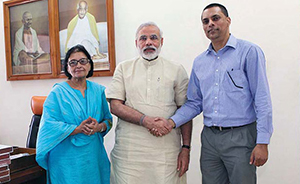Lopsided Healtcare In India
Is good health a fundamental human right? If it is, we in India have failed miserably at that. Let us face it. India is a poor country and the vast majority of people can't afford even the inefficient and generally inadequate public health system. For those with some means, there is a flourishing private health sector, which will match in terms of quality and expertise with what is provided in Western countries. However, number of people who can afford care in these hospitals, though growing, is sadly, still very small. Insurance industry has made things slightly easier but what proportion of our population can really afford to have an insurance policy. In a country, where the vast majority of people are struggling to obtain food, clothes, proper sanitation, and shelter, is it really surprising that most people can't afford an insurance policy? Insurance funding is, by no means, without any evils either. It can inflate the costs of healthcare and can take the decision-making away from doctors and patients into the hands of powerful insurance industry. Moreover, countries like USA have shown us that poor suffer in a system over-reliant on insurance.
I don't blame these people for then turning to chemists, quacks, or anybody who will give them any advice for their medical needs. Life is cheap here and education levels low. Little do they realize that this "cheap " advice can actually prove very expensive in the long term. They are desperate for some relief for their ailments and will turn to anybody, who will talk to them. Government on their part is quite happy to turn a blind eye to all this and does not care if these people get any medical treatment at all or not. I understand the anguish a qualified doctor may feel when s/he has to compete with quacks and chemists for "work". However, that is not my primary concern. Believe me, these patients haven't got anything to give you for your professional fee. Quacks are happy extorting them and chemists giving free (unqualified) advice. Medical profession is by and large struggling, as we don't have adequate resources in most of rural India for doctors to go and work in. We all are hence competing mainly with our qualified professional colleagues in the overcrowded urban areas.
Can anybody really blame doctors for not wanting to live and work in rural areas where there are little support systems for a civic society (not that our cities have them all) and medical infrastructure next to non-existent? That is where government comes in, to provide us with something that markets have failed to. Isn't this why we have a state? Yes, I have recently come from United Kingdom (and I am not saying National Health Service in UK is immune from all evils), but at least poor there get a quality healthcare, which is beyond the scope of even the middle classes in India. Whose responsibility is it to ensure our districts and villages have hospitals and doctors and nurses to work in them? How did British government solve the problem of a huge shortage of General Practitioners in the country? They incentivized the role. They made it so lucrative to be a GP that many hospital consultants started wondering if they had made a wrong choice! Is it really rocket science? If government started paying doctors and nurses well, there will be no shortage of people wanting to work in rural areas. However, all this will need investment in health and infrastructure from our corruption infested government and bureaucracy, where health is not even an agenda on national priority list.
One then wonders, whether private healthcare providers could do something instead. The answer to that is a flat NO. Rural India, just like their poor counterparts in urban areas, will not have enough resources to be able to afford a completely private healthcare, not in the near future. As a last resort, one hopes that the third sector (Non Governmental Charitable Organizations), which is really vibrant in India, will do something for it. Running charitable hospitals however is not easy and requires tremendous dedication and resources. Though there are some good local examples out there, it cannot solve all our healthcare needs. What then is the solution? Here is my take at it.










Comments.